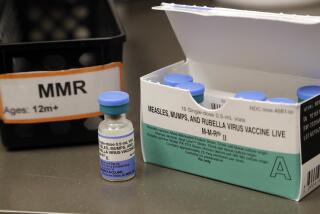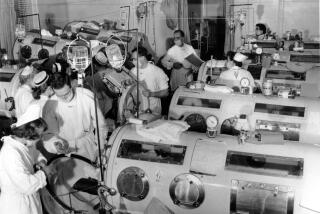Anti-vaccination movement: It’s time for doctors to take a stand
Are doctors inadvertently fueling the anti-vaccine movement?
A study published Monday in the Journal of Pediatrics analyzed more than 100 vaccine discussions involving 16 healthcare providers and found that how the doctor phrased the vaccine question had an impact on swaying parents who were hesitant about whether to vaccinate their children.
The study found that when doctors told parents it was time to vaccinate (“It’s time for Bobby to have his shots”) rather than presenting it as a question (“What do you want to do about Bobby’s shots?”), parents were much more likely to accept vaccination. As the study by Dr. Douglas Opel, assistant professor of pediatrics at the University of Washington School of Medicine in Seattle, suggests, doctors need to stop presenting vaccination as a question and more assertively advocate for the potentially lifesaving vaccination of young children.
Of course, parents should not be pressured into vaccinating. They should have questions answered and should make decisions based on informed consent. But from a public health perspective, vaccination should not be presented as a choice, implying equally valid options, especially in the context of rampant vaccine misinformation.
From the moment of conception, today’s parents are swamped with information overload and an endless barrage of choices. The Internet is teeming with information on every conceivable choice a parent may encounter. Parents don’t need to go very far to find opposition to vaccination, whether in play groups or online. Though suspicion about vaccines is not new, a now widely discredited study published in 1998 linking the measles, mumps and rubella vaccine to autism kicked the panic over vaccines into overdrive. And anti-vaccination zealots like Jenny McCarthy continue to fire up the “debate.”
While the scientific and medical communities overwhelmingly support vaccination, skepticism over vaccine safety and effectiveness has become way too common. Not unlike climate-change deniers, the anti-vaccine movement continues to sow doubt by presenting scientific consensus as debate.
Parents usually try to do what is best for their families. Still, the decision on whether to vaccinate affects not just the individual family but the broader community. With outbreaks of whooping cough and measles linked to vaccine refusal, public health officials, doctors, scientists and parents need to rethink how we talk about vaccines. There are too many loopholes for people to opt out of vaccinating either for religious or philosophical difference, and the consequences of choice can be fatal.
Doctors and health professionals need to take a stand in the fight against the anti-vaccination movement by taking back some of their expertise. Patient and doctor relationships have changed significantly from a 1960s model of “doctor knows best” to a more partnership-oriented customer service model. Though in many ways this shift has been good -- allowing parents to take ownership of health decisions for their families -- an unintended consequence of the partnership model is that it creates an opening for misinformed parents to make medically unsound decisions. The abundance of information available online has instilled a sense that we are all experts just by Googling. But let us not forget that a search session on a Web browser cannot replace the years of training and research that come with scientific and medical expertise.
Doctors have the influence to sway parents who are unsure about vaccination, and this study shows that influence is powerful. The individual parent may think he or she is making a choice for his or her child alone, but the decision impacts all of us.
ALSO:
Obama should just say ‘I was wrong’ on health insurance pledge
‘Saturday Night Live’ on its diversity problem: Arrogant and not funny
Susan Rohwer is a freelance journalist. Follow her on Twitter @susanrohwer.
More to Read
A cure for the common opinion
Get thought-provoking perspectives with our weekly newsletter.
You may occasionally receive promotional content from the Los Angeles Times.






